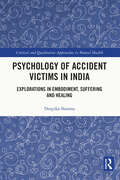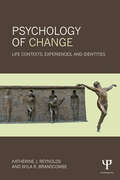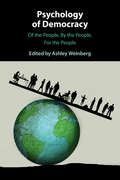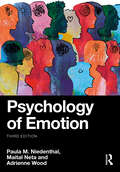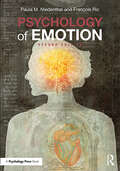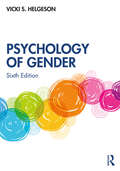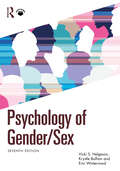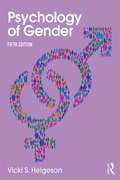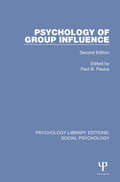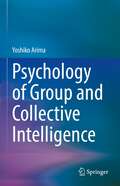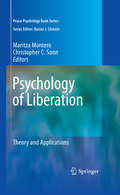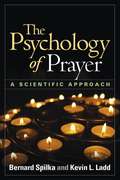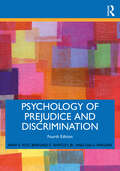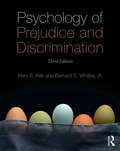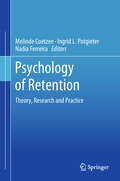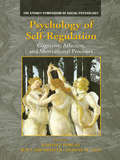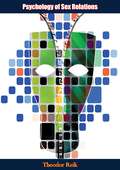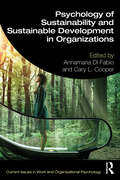- Table View
- List View
Psychology of Abuse
by Juan Moises de la SernaIn this eBook, we will approach one of the most important themes of our time, abuse, both physical and psychological, from a new perspective. This eBook will help us know a reality that is scarcely talked about beyond the circles of health and safety specialists, and that is extended all through life. Abuse in all its forms will affect every individual in different ways, despite the efforts made by some authorities to stop social inequalities, such as gender violence.
Psychology of Accident Victims in India: Explorations in Embodiment, Suffering and Healing (Critical and Qualitative Approaches to Mental Health Experiences among Vulnerable Groups)
by Deepika SharmaThis book traces the psychological journey of accident survivors with locomotor disability, as they move from processes of suffering to healing. It provides a holistic understanding of disability by looking into the embodied understanding of the body as shaped by the socio-political and cultural discourses around impairment. The book addresses the lack of critical qualitative research on the health and well-being of Persons with Disabilities (PWDs) by developing a nuanced understanding of their experiences. It showcases the challenges PWDs face and the process of recovery and regaining agency through interviews and personal narratives. It also highlights the steps we need to take to better understand and address the everyday needs of PWDs and make our society more inclusive. An important addition to the research on disability studies in the Global South, this book will be useful to researchers and students interested in the areas such as disability studies, critical health psychology, mental health of vulnerable populations, and qualitative research as well as professionals working in the area of health and rehabilitation. People engaged in policymaking related to disability services, rehabilitation and rights will also find this book helpful.
Psychology of Behavioural Interventions and Pandemic Control: Lessons from COVID-19 (Lessons from the COVID-19 Pandemic)
by Barrie GunterPsychology of Behavioural Interventions and Pandemic Control is a unique text that examines the COVID-19 pandemic in relation to population risk factors and the efficacy of non-pharmaceutical interventions deployed by many governments around the world to bring the pandemic under control. The book presents critical and insightful lessons that can be drawn up to assess governments’ performance in relation to the pandemic and to guide the construction of effective measures to put in place in readiness for any future public health crises on this scale. It starts by examining lessons learned from historical pandemics and then turns to early epidemiological modelling that influenced the decision of many governments to implement wide-ranging interventions designed to bring public behaviour under close control. It also examines the findings of research that tried to understand pre-existing population risks factors which had some mediating influences over COVID-19, mortality rates, and the effects of interventions. Early modelling work is critiqued, and the discussion also identifies weaknesses in early modelling research. The author, Barrie Gunter, goes on to consider ways in which multiple disciplines can be triangulated to produce more comprehensive models of risk. He also offers suggestions on how future pandemic-related research might be constructed to deliver more powerful analyses of the effects of interventions and the role played by different population risk factors. This insight might then deliver better policies for pandemic control and for safe release from that control. This is essential reading for students and researchers in psychology, public health and medical sciences. It would also be of interest to policy makers assessing government strategies, responses and performance.
Psychology of Change: Life Contexts, Experiences, and Identities
by Nyla R. Branscombe Katherine J. ReynoldsChoice Recommended Read This volume tackles the critical question of whether people change or whether they remain relatively constant across the lifespan. Much existing literature in psychology has largely endorsed the concept of stability. Indeed, in many people’s minds, the person is understood to be set in stone, as a function of early socialization and reaching a particular stage of development, evolutionary processes, or traits that are hard-wired from the beginning by genes and biology. However, in recent years, important scientific developments in theory and research concerning the psychology of change have emerged. In contrast to the commonly held conception of the individual as fixed, this research illustrates how malleable people are—showing much behavioral plasticity. The chapters in this volume, written by scholars at the cutting-edge of research into the psychology of change, showcase these developments with the aim of advancing knowledge of the field and encouraging further research. Topics addressed include brain function, cognitive performance, personality, psychological well-being, collective action to achieve social change, responses to life stressors, and political change. The message is clear—the culture we live in, what happens to us along the way, and who we think we are and want to be, can all change people.
Psychology of Democracy: Of the People, By the People, For the People
by Ashley WeinbergDemocracy was forged in the furnaces of oppression, whether combatting tyranny or affirming the rights of the individual. As democracy is under threat in many parts of the world, there has never been a more urgent need to understand political thoughts and behaviours. This lucid and accessible book brings together a global group of scholars from psychology, political science, communication, sociology, education and psychiatry. The book's structure, based on Abraham Lincoln's well-known phrase 'Of, by and for' the people, scrutinises the psychological factors experienced by politicians as representatives 'of' the electorate, the political institutions and systems devised 'by' those we elect, and the societies that influence the context 'for' us as citizens. From trust to risk, from political values to moral and religious priorities, from the personality and language of leaders to fake news and anti-democratic forces, this book provides vital new insights for researchers, politicians and citizens alike.
Psychology of Emotion
by Paula M. Niedenthal Adrienne Wood Maital NetaPsychology of Emotion reviews both theory and methods in emotion science, exploring findings about the brain; the function, expression, and regulation of emotion; similarities and differences due to gender and culture; the relationship between emotion and cognition; and emotion processes in groups. With a focus on emotion in the typically developing individual, the text's main themes include conscious and unconscious processes; the ways in which emotions arise in, and are constrained by, social situations and social processes; the regulation and sharing of emotion and their effects on mental health; and the manner in which culture (including subculture) shapes or moderates some of these processes. A defining assumption of the book, distinguishing it from much of its competition, is that both biology and social situation are important forces in the experience of emotion.Key features of the third edition include: Emphasis on cutting-edge research and insights from contemporary affective science Developmental Details sections, offering in-depth exploration of chapter themes within crucial stages of the human lifespan Key concepts highlighted with bolded vocabulary and integrated Learning Links, providing clear, illustrative connections to each chapter's core topics Comprehensive in its scope yet eminently readable, Psychology of Emotion serves as an ideal introduction for undergraduate students to the scientific study of emotion.
Psychology of Emotion: 2nd Edition
by Paula M. Niedenthal François RicSince the turn of the twenty-first century, the psychology of emotion has grown to become its own field of study. Because the study of emotion draws inspiration from areas of science outside of psychology, including neuroscience, psychiatry, biology, genetics, computer science, zoology, and behavioral economics, the field is now often called emotion science or affective science. A subfield of affective science is affective neuroscience, the study of the emotional brain. This revised second edition of Psychology of Emotion reviews both theory and methods in emotion science, discussing findings about the brain; the function, expression, and regulation of emotion; similarities and differences due to gender and culture; the relationship between emotion and cognition; and emotion processes in groups. Comprehensive in its scope yet eminently readable, Psychology of Emotion serves as an ideal introduction for undergraduate students to the scientific study of emotion. It features effective learning devices such as bolded key terms, developmental details boxes, learning links, tables, graphs, and illustrations. In addition, a robust companion website offers instructor resources.
Psychology of Fear, Crime and the Media: International Perspectives (Researching Social Psychology)
by Derek ChadeeThe media continue to have a significant persuasive influence on the public perception of crime, even when the information presented is not reflective of the crime rate or actual crime itself. There have been numerous theoretical studies on fear of crime in the media, but few have considered this from a social psychological perspective. As new media outlets emerge and public dependence on them increases, the need for such awareness has never been greater. This volume lays the foundation for understanding fear of crime from a social psychological perspective in a way that has not yet been systematically presented to the academic world. This volume brings together an international team of experts and scholars to assess the role of fear and the media in everyday life. Chapters take a multidisciplinary approach to psychology, sociology and criminology and explore such topics as dual process theory, construal level theory, public fascination with gangs, and other contemporary issues.
Psychology of Gender
by Vicki S. HelgesonNoted for its fair and equal coverage of men and women, Psychology of Gender reviews the research and issues surrounding gender from multiple perspectives, including psychology, sociology, anthropology, and public health. Going far beyond discussions of biological sex and gender identity, the text explores the roles that society has assigned to females and males and the other variables that co-occur with sex, such as status and gender-related traits. The implications of social roles, status, and gender-related traits for relationships and health are also examined. The text begins with a discussion of the nature of gender and development of gender roles, before reviewing communication and interaction styles and how they impact our friendships and romantic relationships. It concludes with an exploration of how gender influences both physical and mental health. New to the 6th Edition: Emphasis on the intersectionality of gender, considering it as a part of wider social categories such as race, ethnicity, social class, and gender identity Recognition of the increasingly prevalent view that gender is nonbinary Extended coverage of LGBTQ individuals, their relationships, and their health Expanded discussions of key issues including gender-role strain, gender fluidity, women and STEM, parenthood, balancing family and work demands, online communication, and sexual harassment Accompanied by a comprehensive companion website featuring resources for students and instructors, alongside extensive student learning features throughout the book, Psychology of Gender is an essential read for all students of gender from psychology, women’s studies, gender studies, sociology, and anthropology.
Psychology of Gender/Sex
by Vicki S. Helgeson Krystle M. Balhan Erin WinterrowdNow in its 7th edition, Psychology of Gender/Sex reviews the research and issues surrounding gender from multiple perspectives, including psychology, sociology, anthropology, and public health. It explores the ways in which gendered experiences are varied across development, social identities, and locations, focusing on the construct of gender/sex, as well as the implications of gender/sex for school, work, relationships, and health.Going far beyond discussions of biological sex and gender identity, the text explores the gender/sex roles that society assigns to people, the various ways in which people break and bend those roles, and the other variables that co-occur with gender/sex, such as status and power.Key features of this edition include: Updated and integrated coverage of LGBTQ+ issues, identities, and experiences Expanded emphasis on the intersectionality of gender/sex Renewed focus on abortion/bodily autonomy and reproduction Expanded discussions of emerging topics such as online interactions and social media, the impact of COVID on gender/sex inequalities, gender/sex in the workplace, and social justice and activism Engaging and readable, Psychology of Gender/Sex is an essential text for all students of gender from psychology, women’s studies, gender studies, sociology, and anthropology.
Psychology of Gender: Fifth Edition
by Vicki S. HelgesonNoted for its fair and equal coverage of men and women, this book reviews the research and issues surrounding gender from multiple perspectives including psychology, sociology, anthropology, and public health, with an emphasis on the interaction between biological and social theories. The implications of social roles, status, and gender-related traits on relationships and health that are central to students' daily lives are emphasized throughout. Students learn how to distinguish the similarities and differences between the sexes and the theories that explain the differences. Methodological flaws that may impact the observance of sex differences are also examined. Learning activities and pedagogical tools included in the text: Do Gender exercises which provide an opportunity to test hypotheses and explore data Sidebars on special interest topics and numerous visuals?that bring the studies to life Take Home Points that summarize key concepts in bulleted format Boldfaced key terms and definitions, chapter summaries, discussion questions, and suggested readings which help students review the material New to the 5th Edition: Expanded sections on cohabitation, homosexuality, online relationships, social media influences, single-sex classrooms, sex differences in math abilities, and gender implications of divorce on health Expanded coverage of gender and parenting, gender and the workplace, gender and power, and balancing work and family An expanded intersectional approach that highlights how gender is connected to social class, race, and ethnicity, including more coverage of gender system justification theory Coverage of transgender issues including recent changes in the DSM guidelines Streamlined discussions to further engage students to think about gender issues A companion website at www.routledge.com/cw/Helgeson where instructors will find Power Point slides, multiple choice quizzes, and short answer questions with suggested answers for each chapter; and students will find flashcards of key terms, chapter outlines, and links to related websites and further reading Divided into three parts, each section builds on the previous one. First, gender and the development of gender roles across cultures are introduced. Scientific methods used to study gender, attitudes toward gender, and the latest data and theories on sex differences in cognitive, social, and emotional domains are then introduced. Theories of gender-role development, including evolutionary, social learning, social role, and gender schema theories are reviewed along with the implications of gender on achievement. Part one reviews the key information on the similarities and differences between the sexes and the theories that explain the differences which lay the foundation for the remainder of the book. Part two examines the role of gender in relationships including communication styles and the impact of these interactions on friendship and romantic relationships. The third part examines the role of gender on physical and mental health. The effects of marriage and parenting on health are reviewed, including domestic abuse, along with how gender affects the association between work and health. This is an ideal text for upper level gender-focused courses including the psychology of gender, psychology of women or men, gender issues, and gender, women’s, or men’s studies taught in psychology, women’s studies, gender studies, sociology, and anthropology.
Psychology of Group Influence: Second Edition (Psychology Library Editions: Social Psychology)
by Paul B. PaulusOriginally published in 1989, this title showcased new developments, providing a systematic and in-depth overview of some of the basic issues in the field of group psychology. Subject areas range from basic group processes to complex interactive phenomena. There are international contributions, with chapters covering the latest developments in the field at the time. The volume provided students and professionals with a comprehensive, coherent, and interrelated picture of the broad scope of group influence processes. The volume was motivated by the belief that group psychology is a central and important activity for social psychology.
Psychology of Group and Collective Intelligence
by Yoshiko ArimaThis book integrates the findings of group research emphasizing “Madness of the Crowd” versus collective intelligence that highlights “Wisdom of the Crowd.” Thus it provides an overview of psychological research on group processes and collective intelligence, analyzing cognitive, social, and structural factors. Chapters address applications of this research to contexts such as organizations and online behavior, and offer guidelines and hands-on demonstrations of psychological principles. The book is highly relevant to students and instructors in personality and social psychology.
Psychology of Gun Violence: How Smart Choices Can Save Lives
by Janet Shibley HydeWhat motivates people to buy guns? To carry them? To use them? In this urgent and necessary call for action, Janet Shibley Hyde combines incisive cultural analysis with cutting-edge psychological research to offer science-based strategies and practical solutions of reform for the problem of gun violence in AmericaGun violence in the U.S. claims tens of thousands of lives each year. We need a solution more urgently than ever, yet progress is halted from both sides as they fail to understand one another—while some urge for a ban on guns, others are insistent on retaining their firearms. In The Psychology of Gun Violence, Dr. Janet Shibley Hyde shows that in order to bring the epidemic of gun violence under control, we must first understand the psychology of gun ownership, mass shootings, and gun culture in America.Drawing on her research as a developmental psychologist, Hyde investigates the motivations behind gun use and misuse to transform readers&’ understanding of American gun violence and ultimately provide solutions rooted in scientific research. Through psychological research, actionable strategies and real-world &‘good news&’ stories that show progress is not only possible, but happening, The Psychology of Gun Violence will empower readers to take action to reduce gun violence and bolster public health both in their community and their country.
Psychology of Liberation
by Maritza Montero Christopher C. SonnSince the mid-1980s, the psychology of liberation movement has been a catalyst for collective and individual change in communities throughout Latin America, and beyond; and recent political developments are making its powerful, transformative ideas more relevant than ever before. Psychology of Liberation: Theory and Applications updates the activist frameworks developed by Ignacio Martin-Baro and Paulo Freire with compelling stories from the frontlines of conflict in the developing and developed worlds, as social science and psychological practice are allied with struggles for peace, justice, and equality. In these chapters, liberation is presented as both an ongoing process and a core dimension of wellbeing, entailing the reconstruction of social identity and the transformation of all parties involved, both oppressed and oppressors. It also expands the social consciousness of professionals, bringing more profound meaning to practice and enhancing related areas such as peace psychology, as shown in articles such as these: Philippines: the role of liberation movements in the transition to democracy. Venezuela: liberation psychology as a therapeutic intervention with street youth. South Africa: the movement for representational knowledge. Muslim world: religion, the state, and the gendering of human rights. Ireland: linking personal and political development. Australia: addressing issues of racism, identity, and immigration. Colombia: building cultures of peace from the devastation of war. Psychology of Liberation demonstrates the commitment to overcome social injustices and oppression. The book is a critical resource for social and community psychologists as well as policy analysts. It can also be used as a text for graduate courses in psychology, sociology, social work and community studies.
Psychology of Music (The Psychology of Everything)
by Susan HallamHow does music affect our moods? What is the best way to develop musical skills? How does the definition of music vary between cultures? The Psychology of Music explores the important impact music has on our everyday lives, and its influence on society, groups and individual people. It demonstrates how music can benefit our intellectual functioning, and health and well-being, and examines musical ability as both a gift and something that can be developed through learning and practice. Music can enhance our understanding of humanity and modern life and The Psychology of Music shows us the significance of music, and the power it can have over our behaviour.
Psychology of Prayer
by Kevin L. Ladd Bernard SpilkaReviewing the growing body of scientific research on prayer, this book describes what is known about the behavioral, cognitive, emotional, developmental, and health aspects of this important religious activity. The highly regarded authors provide a balanced perspective on what prayer means to the individual, how and when it is practiced, and the impact it has in people's lives. Clinically relevant topics include connections among prayer, coping, and adjustment, as well as controversial questions of whether prayer (for oneself or another) can be beneficial to health. The strengths and limitations of available empirical studies are critically evaluated, and promising future research directions are identified.
Psychology of Prejudice and Discrimination
by Lisa S. Wagner Mary E. Kite Bernard E. Whitley, Jr.Psychology of Prejudice and Discrimination provides a comprehensive and compelling overview of what psychological theory and research have to say about the nature, causes, and reduction of prejudice and discrimination. It balances a detailed discussion of theories and selected research with applied examples that ensure the material is relevant to students. This edition has been thoroughly revised and updated and addresses several interlocking themes. It first looks at the nature of prejudice and discrimination, followed by a discussion of research methods. Next come the psychological underpinnings of prejudice: the nature of stereotypes, the conditions under which stereotypes influence responses to other people, contemporary theories of prejudice, and how individuals’ values and belief systems are related to prejudice. Explored next are the development of prejudice in children and the social context of prejudice. The theme of discrimination is developed via discussions of the nature of discrimination, the experience of discrimination, and specific forms of discrimination, including gender, gender identity, sexual orientation, age, ability, and appearance. The concluding theme is the reduction of prejudice. The book is accompanied by a comprehensive website featuring an Instructor Manual that contains activities and tools to help with teaching a prejudice and discrimination course; PowerPoint slides for every chapter; and a Test Bank with short answer and multiple-choice exam questions for every chapter. This book is an essential companion for all students of prejudice and discrimination, including those in psychology, education, social work, business, communication studies, ethnic studies, and other disciplines. In addition to courses on prejudice and discrimination, this book will also appeal to those studying racism and diversity.
Psychology of Prejudice and Discrimination: 3rd Edition
by Bernard E. Whitley Jr. Mary E. KiteThe Psychology of Prejudice and Discrimination provides a comprehensive and compelling overview of what psychological theory and research have to say about the nature, causes, and reduction of prejudice and discrimination. It balances a detailed discussion of theories and selected research with applied examples that ensure the material is relevant to students. Newly revised and updated, this edition addresses several interlocking themes, such as research methods, the development of prejudice in children, the relationship between prejudice and discrimination, and discrimination in the workplace, which are developed in greater detail than in other textbooks. The first theme introduced is the nature of prejudice and discrimination, which is followed by a discussion of research methods. Next comes the psychological underpinnings of prejudice: the nature of stereotypes, the conditions under which stereotypes influence responses to other people, contemporary theories of prejudice, and how values and belief systems are related to prejudice. Explored next are the development of prejudice in children and the social context of prejudice. The theme of discrimination is developed via discussions of the nature of discrimination, the experience of discrimination, and specific forms of discrimination, including gender, sexual orientation, age, ability, and appearance. The concluding theme is the reduction of prejudice. An ideal core text for junior and senior college students who have had a course in introductory psychology, it is written in a style that is accessible to students in other fields including education, social work, business, communication studies, ethnic studies, and other disciplines. In addition to courses on prejudice and discrimination, this book is also adapted for courses that cover topics in racism and diversity. For additional resources, consult the website BreakingPrejudice.org, which focuses on pedagogical materials that can be used to address both cultural awareness and self-awareness of prejudice and to increase students' multicultural competence. Specifically, the site includes: Original teaching activities (ready to use with minimal preparation, including discussion questions) An annotated list of podcasts (categorized by topic) An annotated list of videos (categorized by topic) A set of social justice songs (categorized by topic) Four original public service announcements 16 video diaries about people's personal experience with prejudice Interviews with 13 social justice activists
Psychology of Religion and Families (Textbooks in Family Studies)
by Loren D. Marks David C. DollahiteNow in its second edition, this multidisciplinary text addresses the growing scholarly connection between religion and family life while offering an accurate and engaging account of why and how families are impacted by their religion.This updated volume integrates the social science literature from family studies, psychology, sociology, and religion with narratives drawn from in-depth interviews with 300 racially, religiously, and regionally diverse families that bring the concepts to life. Written in a thought-provoking, accessible style by two of the leading researchers in the field, this book reflects the author’s first-hand experience in teaching today’s students about religion’s influence on families. This book examines Christianity, Judaism, and Islam, addresses the impact of religious involvement on longevity, divorce rates, and parenting styles, and considers demographic, family, couple, and individual-level data that relate to prayer and other sacred practices. New chapters explore: The Conflicts, Struggle, and Stressors of Religion Racial and Ethnic Minorities and Religion Religion, Sex, and Gender Roles in Marriage Pedagogical features include boldfaced key terms defined in the glossary, text boxes, chapter conclusions, summary points, and review questions. Intended as a text for undergraduate courses in family and religion, the psychology or sociology of the family, the psychology or sociology of religion, pastoral/biblical counseling, or family and youth ministry, taught in human development and family studies, psychology, sociology, religion, social work, pastoral counseling, and philosophy, this book is also relevant to family therapists and counselors.
Psychology of Religion, Fourth Edition
by Ralph Hood Jr. Peter HillScholarly and comprehensive yet accessible, this state-of-the-science work is widely regarded as the definitive psychology of religion text. The authors synthesize classic and contemporary empirical research on numerous different religious groups. Coverage includes religious thought, belief, and behavior across the lifespan; links between religion and biology; the forms and meaning of religious experience; the social psychology of religious organizations; and connections to morality, coping, mental health, and psychopathology. Designed for optimal use in advanced undergraduate- and graduate-level courses, every chapter features thought-provoking quotations and examples that bring key concepts to life. New to This Edition Revised and updated with the latest theories, methods, and empirical findings. Many new research examples. Restructured with fewer chapters for better 'fit' with a typical semester. More attention to the differences between religion and spirituality Covers emerging topics genetics and neurobiology, positive psychology, atheism, and more.
Psychology of Retention: Theory, Research And Practice
by Melinde Coetzee Ingrid L. Potgieter Nadia FerreiraThis book offers a contemporary review of talent retention from the viewpoint of human resource management and industrial/organisational psychology. With a practical and relevant perspective it enriches critical knowledge and insight in the psychology of talent retention. It offers interpretation of difficult factors facing organisations such as the conceptualisation of talent, the forecasting of talent demand and supply, external and internal factors that influence talent attraction, development and retention, the alignment between talent management and business strategy. Also covered is the implementation of human resource practices and strategies in response to the needs of different organisational contexts and workforce characteristics. The chapter contributions will not only enrich knowledge and insight in the complex phenomenon of talent retention, but also advance new original ways of thinking and researching this critically important area of inquiry. The book is intended for graduate students and researchers as an overview of the topic of talent retention, practitioners will also find it informative.
Psychology of Self-Regulation: Cognitive, Affective, and Motivational Processes (Sydney Symposium of Social Psychology)
by Roy F. Baumeister Joseph P. Forgas Dianne M. TiceThe ability to regulate and control our behaviors is a key accomplishment of the human species, yet the psychological mechanisms involved in self-regulation remain incompletely understood. This book presents contributions from leading international researchers who survey the most recent developments in this fascinating area. The chapters shed new light on the subtle and often subconscious ways that the people seek to regulate their thoughts, feelings and behaviors in everyday social life. The contributions seek answers to such intriguing questions as: How can we improve our ability to control our actions? How do people make decisions about which goals to pursue? How do we maintain and manage goal-oriented behavior? What happens when we run out of self-regulation resources? Can we match people and the regulatory demands of to specific tasks so as to optimize performance? What role does self-regulation play in sports performance, in maintaining successful relationships, and in managing work situations? The book offers a highly integrated and representative coverage of this important field, and is suitable as a core textbook in advanced courses dealing with social behavior and the applications of psychology to real-life problems.
Psychology of Sex Relations
by Theodor ReikWitty and fascinating look at Love and the Sex-Drive from world-renowned expert psychoanalysist Theodor Reik.“This book was first published in 1943 and will have been read long ago by all senior psychoanalysts and most students of psychopathology…Even the most obdurate opponents of psychodynamic theory must be disarmed by the high quality of the writing and lost in admiration for the erudition of the author, whose copious quotations, allusions and aphorisms are nearly always apt and frequently both witty and illuminating. They cover a wide field of learning in several languages and range from philosophy and psychology to Lewis Carroll, Punch and the popular press. Too often the ponderous jargon and turgid style of psychoanalytical papers bring back at least one reader to the schoolroom, where he is trying ineffectively to construe the more involved passages of Livy or Thucydides. It is, therefore, refreshing to find a serious work from a psychoanalyst written in clear and impeccable English and leavened on every page with natural sincerity and effortless humour.The main objective of the book is to demonstrate that love, affection and tenderness are not the product of aim-inhibited sex and to controvert the Freudian doctrine that all forms of love are exclusively of sexual origin. Although the author remains a warm and generous admirer of his original teacher, Freud, and of his genius and achievements, he demolishes his libido theory with criticisms, barbed with ironic wit. "His libido system, however, will, I am afraid, have the sad destiny which Herbert Spencer once bemoaned in speaking of 'a beautiful theory that was murdered by a gang of brutal facts"'-British Journal of Psychiatry.
Psychology of Sustainability and Sustainable Development in Organizations
by Cary L. Cooper Annamaria Di FabioThis volume answers calls for improving sustainability and sustainable development in organizations from a psychological point of view. It offers a range of perspectives on the current research in the psychology of sustainability and sustainable development to highlight effective ways of improving well-being and healthy sustainable development in organizations. Section 1 introduces the concept of the psychology of sustainability and sustainable development as well as macro topics of related issues in organizations. Section 2 focuses on themes traditionally recognized in organizational psychology literature, such as performance, negotiation, leadership, resistance to change, innovation, and digital transformation. Section 3 presents variables to enhance sustainability and sustainable development in organizations and considers levels of prevention. Topics include humor awareness as a primary prevention resource in organizations, intrapreneurial self-capital as an individual preventative strength, compassion within organizations, perfectionism as an inhibitor in organizational contexts, and job crafting from individual to collaborative to organizational, meaningfulness and sustainable careers. With a clear psychological focus on the topic of leading sustainability efforts, this book will be of great interest to students and academics who want to learn more about corporate sustainability. It is also a useful resource for business executives, team leaders and managers.

